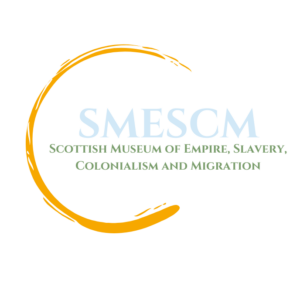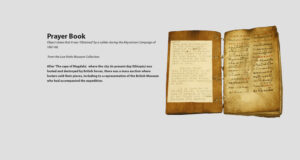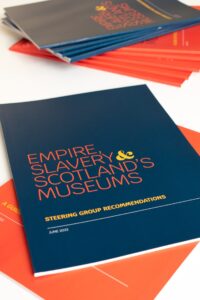Introducing the Scottish Museum of Empire, Slavery, Colonialism and Migration

Salma Ali and Grace Browne, Co-Lead Coordinators for the newly established Scottish Museum of Empire, Slavery, Colonialism and Migration (SMESCM), discuss how the work of Empire, Slavery & Scotland’s Museums enters a new phase of delivery and help set out how the museum can become a more accessible and representative space.
In 2024 The Scottish Government accepted recommendations from The Empire, Slavery and Scotland’s Museums Steering Group (ESSM) on how museums can address Scotland’s involvement in empire, colonialism, and historic slavery. A new phase of work to deliver these recommendations has begun. The Steering Group will continue to provide their expertise, and have transitioned to a committee offering guidance and support on the development of the Scottish Museum of Empire, Slavery, Colonialism and Migration (SMESCM).
This project will deliver on ESSM’s recommendation one: to create a dedicated space to address [Scotland’s] role in empire, colonialism, and historic slavery led by an entirely new organisation. As the first staff to join the project as Co-Lead Coordinators, together we will work to bring this project to life and to deliver on our vision:
A Scotland committed to anti-racism that explores and addresses the legacies of empire, slavery, colonialism and migration. Through connecting people to our shared histories, we have a platform from which to imagine, name and resource a more equitable and collectively owned future.
This work aims to deepen our collective understanding and appreciation of Scottish (global) history and to explore the legacies of its colonial history on our communities today. We endeavour to challenge singular perspectives in the dominant discourse through highlighting and celebrating alternative and marginalised histories, thus, creating space for imagining a more equitable future.
Developing this vision demands a purposeful approach. We seek to reflect on current practices while developing counter-cultural approaches, methodologies, and sustainable partnerships to create a new, alternative “space.” We will co-create and experiment with the forms this space could take, including both physical and digital models, in the hopes of creating a space that animates marginalised histories with care and collaboration.
As Co-Lead Coordinators we will not be the only voices deciding what this new space could look like or be. Rather, we will develop co-production projects with community groups, academics, educators, and grassroots organisations across Scotland that will help define the vision, strategy, and forms that the project could take. The space is intended to be for the people, so we are creating a platform for local communities to share their own stories and lived experiences. Co-production, thus, allows us to develop a space for the people by the people where they are empowered to reclaim their history. Together, we will investigate the myriad of ways that the legacies of colonialism and imperialism take shape within our society and share own histories and experiences to demonstrate, and make place for, the diversity of Scottish history.
However, developing a space that challenges imperial, colonial, and capitalist structures requires a two-fold approach. That is, approaches that are not only external, but also internal. While externally we aim to use co-production as a means to develop a more accessible and representative space, internally, we aim to build work practices that put people first and emphasise creativity, flexibility, and equity from the outset.
We are excited to develop the vision of this new space and are working eagerly to carry it out. Through co-production we hope to uncover alternative historical narratives and legacies that enrich and celebrate Scotland’s diversity. There’s a long way to go and much work to do, but in knowing that the journey is more important than the destination, we recognise the need to be patient, creative, and willing to fail.
We are also opening applications to recruit new trustees! Further information can be found on the Jobs and Opportunities page or on the Scottish Museum of Empire, Slavery, Colonialism and Migration website.
We invite you to collaborate with us, whether by applying to be a trustee, or by sharing your stories and ideas! Please do get in touch with your ideas, interests or questions. Remember, no idea is too big, or too small so send them along to information@empiremuseum.scot. We look forward to future conversations and going on this journey together.


